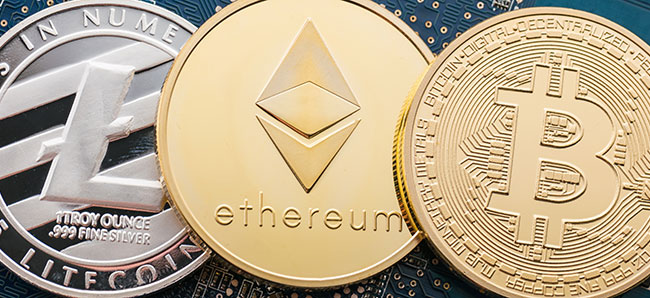Way back in April 2013, this firm became one of the first law firms in the United States to accept Bitcoin (BTC), a cryptocurrency, as a form of payment for legal services (Read the blog article).
At the time, Bitcoin was trading for around USD$200/BTC, and the “big bitcoin miners” were performing calculations measured in the “giga-hash” range. At the time, it was possible to use a high-end computer graphics card (or GPU for short) and actually generate around 0.01 BTC or more per month (equating to a couple of bucks or so). The shopping-cart tools were not very good, although it was possible to have a “Pay by Bitcoin” link on your website, going to Coinbase. There were only a few other alternative cryptocurrencies at the time, including Litecoin (LTC) and Namecoin (NMC), but trading and use in commerce was very rare.
My, how the times have changed.
Today, Bitcoin is trading over 3,300% from what it was in April 2013 — around $6,600/BTC, and the “big bitcoin miners” are performing calculations measured in the “penta-hash” range, representing a million-fold increase from the performance back in 2013. It’s almost impossible for enthusiasts to compete with the big bitcoin miners now, although it’s possible for anyone to purchase a dedicated AISC-based mining appliance that produces a stunning 13 TH/sec for about $2,000 (See the Antminer S9). While such AISC-based devices have overtaken GPU’s for Bitcoin mining, GPU’s have come back with a vengeance in the mining space for other types of cryptocurrency — to such an extent that the supply of high-end graphics cards has been impacted with traditional supply and demand economics (See Cryptocurrency mining is making some graphics cards stupidly expensive, by Digital Trends, June 26, 2017).
Today, the problems with Bitcoin I identified in my 2013 blog article are almost a thing of the past. Cryptocurrency is associated with legitimate business – BIG, legitimate business. The red-flag words such as “hacker,” “theft,” “launder,” and “bubble” are not the norm.
The tools to accept and conduct business in cryptocurrencies have improved drastically. We can now integrate a number of cryptocurrencies seamlessly into our shopping cart experience, with “near” realtime currency conversions. L4SB is now accepting Bitcoin (BTC), Litecoin (LTC) and Dogecoin (Doge), with more currencies being added as fast as we can. L4SB will also offer a range of legal services intended to serve the cryptocurrency market, as well as individuals and businesses who hold, exchange and conduct business in cryptocurrency.
Cryptocurrencies are here to stay
It’s hard to predict the future, and we therefore don’t know the long-term value and viability of Bitcoin versus Litecoin versus Ethereum (ETH) versus the others. What we do know is this:
- The tools and applications to utilize cryptocurrencies will continue to improve dramatically over time.
- The demand for cryptocurrency will continue to grow. This is because:
- Consumer adoption will continue to grow (See Google Search), although how fast and when “mass adoption” occurs is anyone’s guess.
- L4SB is seeing an uptick in small merchants accepting cryptocurrencies and believes this trend will continue, although there are skeptics who feel big retailers are jumping off the Bitcoin bandwagon (See Bloomberg article, Bitcoin Acceptance Among Retailers Is Low and Getting Lower).
- Finally, existing cryptocurrency holders continue to buy into their favorite digital coins, sometimes with easy and convenient services that periodically withdraw funds to buy more cryptocurrency (See, for example, Coinbase’s recurring transaction feature).
- The supply of some cryptocurrencies (especially Bitcoin) is limited:
- Some currencies, including Bitcoin, have a controlled supply and will eventually max out the number of coins.
- As of today, almost 80% of Bitcoins have been “mined” and are available.
- Given the nature of cryptocurrencies, in that they are encrypted with passwords only the holder can know, when a cryptocurrency owner dies or becomes incapacitated, it’s possible the cryptocurrency is gone forever (Read Fortune’s article entitled, What Happens to Cryptocurrency When You Die?).
- The increase in demand, along with the decrease in supply, will mean the value of some cryptocurrencies will increase significantly (Business Insider says the value of Bitcoin can reach $500,000 by 2030).
L4SB is Committed to Cryptocurrency
L4SB has been a supporter of Bitcoin since 2013, and is increasing its support to other cryptocurrencies, by providing (i) competent, cost-effective, legal services that can be paid by your favorite cryptocurrency, and (ii) specific legal services targeting cryptocurrency users. Such services include:
- Anonymous LLC. Doing business in your personal name? Take advantage of the liability protection, tax features, survivability and flexibility only a LLC can provide. Let L4SB form a US-based limited liability company (or LLC) that protects your identity, so that no one can look up ownership information on the Internet.
- Trademark Registration. Using a clever name for your business, and want to protect it against infringers? Only a trademark can give you the ability to protect your valuable mark against others in the United States.
- Death and Incapacity Protection. Soon, L4SB will provide a service to cryptocurrency holders that ensures your loved ones will be able to access your hard-won cryptocurrency in cases of emergencies or death to your estate. Stay tuned for more information.
Law 4 Small Business. A little law now can save a lot later. A Slingshot company.

